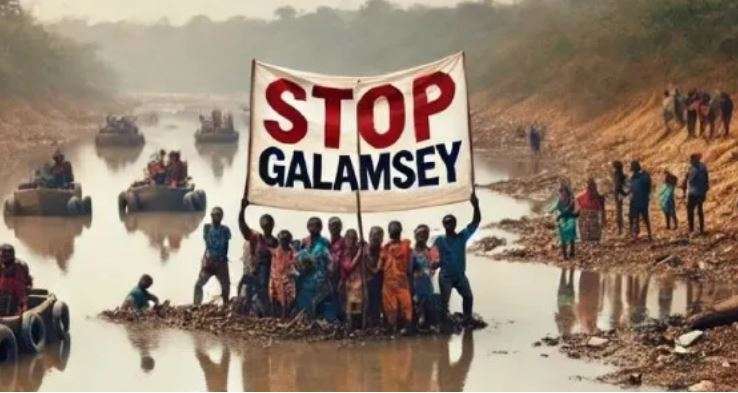As the debate on illegal mining (galamsey) rages on, The Ghana Coalition Against Galamsey (GCAG) is calling on President John Dramani Mahama to demonstrate urgent leadership in ending the destructive menace.
The Coalition warned that the country faces an existential environmental and public health crisis if decisive action is not taken.
Their demand came in a detailed letter submitted to the Presidency following President Mahama’s recent dialogue with Civil Society Organisations (CSOs) at the Jubilee House.
That engagement brought together government representatives, faith-based groups, advocacy bodies, and professional associations to deliberate on practical solutions to combat the scourge of galamsey, which has polluted rivers, destroyed farmlands, and left many communities vulnerable.
In their submission, the GCAG described illegal mining as a “national emergency” that requires courage and clarity from the President.
“Given this unprecedented crisis, our demand is clear and urgent —“We ask you, Mr. President, to clearly tell us your granular definition of success in the fight against Galamsey and also share with us a definitive roadmap, with key milestones and timelines, that you see will get us there.”
The GCAG stated that they had discussed the menace long enough and, while they had been talking, they had watched the ecological system being severely damaged, adding that it was now time to summon the political will to end the destruction, emphasizing that this was an urgent time for leadership and that the nation was looking to the audience for that leadership in such a critical and historic moment.
Key Demands to the Presidency:
The coalition outlined 12 urgent demands, including the establishment of fast-track courts to prosecute illegal mining cases, a clear benchmark for invoking a State of Emergency, and transparency in tracking prosecutions of politically exposed persons and alleged kingpins identified in the Frimpong Boateng report.
It also called for stronger accountability measures, including monthly and quarterly reports on water quality, forest reserves, and food safety in mining-affected areas.
“Your Excellency, our environment, our health, our national security, and our children’s future depend on your bold and decisive leadership in dealing with the menace of Galamsey with immediate effect.”
The coalition also pressed for community-level protection for anti-galamsey activists who have reportedly faced intimidation and persecution in towns such as Atronsu and Breman.
“Community members who have stood firm against the menace of Galamsey have become targets for persecution and intimidation, and their rights to demand a safe and healthy environment must be upheld.”
In addition, the GCAG urged the state to confiscate lands where illegal mining is taking place and investigate traditional leaders for complicity.
“Areas where Chiefs have stood against Galamsey have no Galamsey happening, and no one can engage in Galamsey without the Chiefs’ knowledge and, most times, acquiescence.”
Public Health and Environmental Concerns:
The letter underscored the devastating health impacts of galamsey, citing findings from a joint assessment by the Environmental Protection Agency (EPA) and Pure Earth.
The study revealed that mercury levels in Konongo Zongo soil were 560% above safety limits, while arsenic concentrations in water sources were 330 times higher than national standards.
These levels of contamination have been linked to kidney disorders, mercury traces in children, and pregnancy losses.
“We either deal with this menace or we perish, because without clean water, air and sustainable forests, we are done as a people.”
The GCAG’s did not mince words, as it’s letter was unsparing in its language, framing illegal mining not only as an economic or environmental challenge but as a crime against future generations.
“Not to act decisively and energetically to bring this atrocity to an end is to be complicit in this wilful ‘ecocidal’ genocide of monumental proportion.
“History, we dare say, will judge you (and this entire present generation) harshly, if we allow this opportunity to restore a wholesome environment to pass us by.”
It added that while some view galamsey as a source of short-term economic benefit, the broader costs in terms of food security, water resources, and public health make it “exceedingly shortsighted” to ignore the long-term consequences.
“We are indeed getting what seems like economic benefits in the short-term, but the trade-offs on other sectors of national health, food security, water and forests are conclusive and cannot be ignored any longer.”
The coalition’s letter signals a growing impatience among civil society groups who argue that successive governments have failed to decisively address the crisis despite repeated pledges.
With rivers like the Pra, Ankobra, and Offin visibly polluted and communities displaced by destructive mining, pressure is mounting on the Mahama administration to translate rhetoric into action.
Whether President Mahama will heed the call for a definitive roadmap, state-led accountability mechanisms, and possible declaration of a State of Emergency remains to be seen.
For now, the coalition insists that the choice is clear: bold action or complicity in what it describes as a national tragedy.
By Nelson Ayivor


